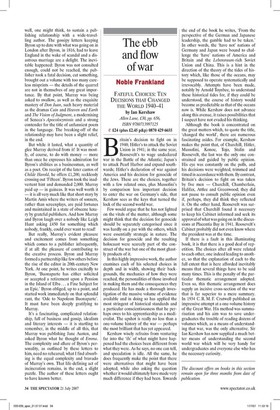The ebb and flow of war
Noble Frankland FATEFUL CHOICES: TEN DECISIONS THAT CHANGED THE WORLD 1940-41 by Ian Kershaw Allen Lane, £30, pp. 656, ISBN 9780713997125 £24 (plus £2.45 p&p) 0870 429 6655 Britain's decision to fight on in 1940; Hitler's to attack the Soviet Union in 1941; in the same year, Roosevelt's to wage undeclared war in the Battle of the Atlantic; Japan's to attack Pearl Harbor and expand southwards; Hitler's declaration of war against America and his decision for genocide of the Jews. These are the choices, together with a few related ones, plus Mussolini's by comparison less important decision to enter the war on Germany's side, that Kershaw sees as the keys that turned the lock of the second world war.
Few would argue that he has not lighted on the vitals of the matter, although some might think that the decision for genocide should be separately categorised since it was hardly on a par with the others, which were essentially strategic in nature. The decision for genocide and the resulting holocaust were scarcely part of the construct of the war but one of the most ghastly products of it.
In this highly impressive work, the author examines each of his selected choices in depth and in width, showing their backgrounds, the mechanics of how they were reached, the personalities of those involved in making them and the consequences they produced. He has made a thorough investigation of the massive volume of evidence available and in doing so has applied the most stringent of historical standards and a particular conscientiousness that he perhaps owes to his apprenticeship as a medievalist. The upshot is really no less than a one-volume history of the war — perhaps the most brilliant that has yet appeared.
Kershaw wisely refrains from venturing far into the 'ifs' of what might have happened had the choices been different from what they were. As he says, no one can tell, and speculation is idle. All the same, he does frequently make the point that there were alternatives that might have been adopted, while also asking the question whether it would ultimately have made very much difference if they had been. Towards the end of the book he writes, 'From the perspective of the German and Japanese leadership, the gamble had to be taken.' In other words, the 'have not' nations of Germany and Japan were bound to challenge the 'have' nations of America and Britain and the Lebensraum-rich Soviet Union and China. This is a hint in the direction of the theory of the tides of history which, like those of the oceans, may be supposed to operate systematically and irrevocably. Attempts have been made, notably by Arnold Toynbee, to understand these historical tides for, if they could be understood, the course of history would become as predictable as that of the oceans now is. While Kershaw does not advance along this avenue, it raises possibilities that I suspect have not evaded his thinking.
Although the book is concentrated on the great matters which, to quote the title, 'changed the world', there are numerous fascinating asides. For example, Kershaw makes the point that, of Churchill, Hitler, Mussolini, Konoe, Tojo, Stalin and Roosevelt, the last was the only one constrained and guided by public opinion. His eye was constantly on the polls, and his decisions were weighted, trimmed and timed in accordance with them. By contrast, Britain's decision to fight on was taken by five men — Churchill, Chamberlain, Halifax, Attlee and Greenwood; they did not pause to consult public opinion even if, perhaps, they did think they reflected it. On the other hand, Roosevelt was surprised that Churchill found it necessary to keep his Cabinet informed and seek its approval of what was going on in the discussions at Placentia Bay in 1941. Roosevelt's Cabinet probably did not even know where the president was at the time.
If there is a fault in this illuminating book, it is that there is a good deal of repetition. The choices after all were related to each other, one indeed leading to another, so that the explanation of each to the full extent that is here afforded inevitably means that several things have to be said many times. This is the penalty of the particular thematic arrangement adopted. Even so, this thematic arrangement does supply an incisive cross-section of the war that is far superior to a mere summary. In 1934 C. R. M. E Crutwell published an impressive attempt at a one-volume history of the Great War. His method was summarisation and his aim was to save undergraduates the trouble of reading dozens of volumes which, as a means of understanding that war, was the only alternative. Sir Ian Kershaw has now supplied a much better means of understanding the second world war which will be very handy for undergraduates and everyone else who has the necessary curiosity.
The discount offers on books in this section remain open for three months from date of publication.












































 Previous page
Previous page